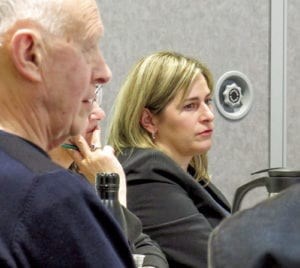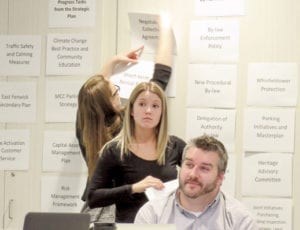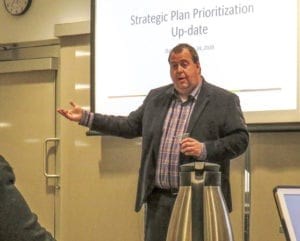In marathon session, Town Council and senior staff lay out priorities for next 18 months
What Pelham CAO David Cribbs characterized as “dynamic tensions” were the order of business last Monday evening, as Town Council participated in a strategic plan prioritization session held at the community centre. Present were all six councillors, Mayor Junkin, Cribbs, Town department heads, a handful of support staff, and the Voice.
The culmination of the three-hour meeting was a list of six groupings of issues to be addressed in descending order of priority. Each group contained five issues, and there was no prioritized ranking within groups. The understanding was that items in the top groupings would be dealt with immediately, while those lower on the list would be dealt with over the course of the next 18 months.
Acting as facilitator, Cribbs presented PowerPoint slides to support and direct discussion. The first visual was a Venn diagram, consisting of three interlocking ideals: low taxes, low housing density, and stable services. Cribbs maintained that a position in the centre, where all three overlap, “does not exist.”

Councillor Bob Hildebrandt took exception to Cribbs’ remark, arguing that “technology and superior staffing” were not reflected in the diagram’s composition. Cribbs responded that the diagram appears as a standard concept in many public administration textbooks, but conceded that there are other elements in play, and that “technology can be a great booster” when it comes to economizing within municipal budgets. As a general rule, however, big residential lots paying relatively little property tax per address, coupled with residential demand for generous services, translates into a need for comparatively high tax rates.
A list of 2019’s Town accomplishments came next, referencing such notable events as the passing of two budgets, the update of multiple bylaws, progress on cannabis legislation, reduction of operating costs at the new community centre (MCC), positive steps toward rebuilding the arches above Pelham Town Square, work to save the Town’s tree canopy from gypsy moth infestation, short-term rental policy measures, adoption of rigorous financial management policies, and steps toward rebuilding a measure of trust with the community.
Councillor Ron Kore was skeptical.
He asked whether the successes were attributable to council, Town staff, or, in some instances, community groups (the arches rebuild, spearheaded by the Fonthill Rotary Club being an example). Kore worried about residents’ perceptions of the accomplishments, were they to be released to the public.

Cribbs responded that the PowerPoint was a staff summary, not a council report, and in any case the slides were currently available on the Town’s website (as are all council meeting agendas and accompanying notes) and consequently already in public view. (Monday’s council gathering was also a public meeting.)
Cribbs reminded council of how tasks are accomplished by a municipal government.
“Staff do 95% of the heavy lifting at their desks, away from the cameras. [Staff] don't pass anything, [council passes] it. Staff does the research and prepares the drafts. It's a conjunctive effort,” said Cribbs. “This is the way the system is supposed to work. [Staff] have got some expertise and knowledge, but we don't have a mandate or a vision of the community. [Staff and council] hang out together until we get something that reflects what the community needs.”
The CAO noted that some of the cited accomplishments were still works in progress, but that significant effort had been expended to bring them to this stage of fruition.
“If you look at the our current operational strategic plan, we've accomplished virtually all of the financial goals. You've had an extremely successful year putting policy and rules in place to address the shortcomings of the past, and to prevent such occurrences from happening again.”
Councillor Mike Ciolfi said that he understood Pelham had delayed updating its official plan due to the possibility that the province would amalgamate lower-tier municipalities in Niagara. Director of Planning and Development Barbara Wiens noted that the Town’s existing plan is current, having been passed in 2014, but that Pelham must wait for the Region to update its own plan first.

Ciolfi asked whether an intensification plan would protect the character of Pelham’s mature neighborhoods, and whether an amendment to the zoning bylaw was advisable to direct where high-density growth would be permitted in the municipality.
“This is a big issue in our town,” he said. “Could we have a subdivision that’s been here for many years, all of a sudden get chopped up with high-rise developments?”
“Policies don’t allow for that,” responded Wiens. “The official plan does identify eleven areas for intensification. But the document does allow that in addition to those designated areas, intensification can occur throughout the town, subject to meeting certain criteria. We evaluate applications on that basis. The current official plan has those guidelines.”
Discussion of parking issues prompted Cribbs to mention a glaring bylaw absence, one that would enable the Town to collect revenue from developers for parking spots.
“There are a bunch of components to this, so in [staff’s] mind, it's a big issue. Parking congestion at the MCC is just one symptom of a multi-product parking monster. With the Town’s growth of 3.35%, that is just going to get recognition no matter what.”
Ciolfi stressed the critical need for more parking at the MCC in particular, indicating that the problem will only get worse if unaddressed.
“More revenue-generating rentals are coming in…we’ve got basketball tournaments and hockey coming in every weekend...the need for additional parking is huge.”
Cribbs advocated a broader stroke approach, working towards a master parking strategy for Pelham that would include not only the MCC, but also the downtowns of Fonthill, Ridgeville, and Fenwick.
Mayor Junkin said he thought that the future of the Town’s libraries was “an important issue, but not a ‘top five’ priority...things are functioning pretty well. I see this as something that will evolve over time, not over the next few weeks.”
Councillor Lisa Haun responded that there had been a great deal of interest in, and support of, the library reflected in recent media coverage of the issue. Council had publicly announced its intention to work for solutions with the library board, and Haun said it was “critical to match our [priority rankings] with our behaviour of the past few weeks…indicating there is a sense of urgency.”
Asked for his own priority item, CAO Cribbs said, “Collective agreements with workers are an issue that doesn’t matter much to the general public, but to the corporation, they are critically vital…perhaps the most important piece out there.”
Cribbs also noted that the Town would do well to administer its own penalties for bylaw violations, rather than offloading them to the Region or province. So-called “AMPs," or administrative monetary penalties, were added to Ontario Municipal Act about a decade ago, and are similar to court-levied fines, such as parking tickets, and imposed through an administrative process that stops short of violators having a criminal record or being imprisoned. Appeals to citations would be heard locally, said Cribbs, by an independent hearing officer on retainer, possibly shared among neighbouring municipalities.
Haun brought up the issue of communication between Town staff and council, which prompted an impassioned response from Kore.
“When we let other people dictate the news, we always get in trouble. We shoot ourselves in the foot, then try to backtrack. If we had been provided better communication, to get our information out to the public through the Tribune, the Voice, the Standard, and said these are our decisions and why we made our decisions, I think half the noise would go away. But we always seem to read about an issue on the front page of the newspaper, and then we have to talk about it, and decide what to do. And if we don’t get the right spokesman out in front, then it’s worse.”
Councillor Marianne Stewart agreed.
“Sometimes [councillors] get our town news from the paper, rather than Town staff, and we need to ensure we are informed.” Stewart advocated a “proactive” communications protocol.
“That is not a universe in which we exist,” responded Cribbs. “I’m sorry, but the newspaper beats us to stuff all the time. It’s a free press in this country, and it quite often figures things out before staff does. We can put out our own press releases, but the newspapers will print whatever they wish.”
Haun suggested that the Town “front-load” charges to developers, rather than having the Town assume the risk, given the potential for the economy to slow. Wiens clarified that the Town already does so, collecting charges when construction permits are approved, not when developments are completed. The developer pays for the project’s roads, sanitary sewer, water, and other costs.
Councillor John Wink was eager for a succession plan to be highly prioritized, which would establish a stream of competent staff to step in when senior managers and other Town employees are lost to retirement or departures elsewhere. Kore suggested that qualified college and university students could economically assist with some municipal assignments, to which Cribbs responded there was already such a plan in place.
Cribbs noted the need for a “whistleblower policy,” which allows a rank-and-file staff member to bring instances of malfeasance by superiors to the attention of senior management, and protects staffers from retribution. He suggested that this was a doable short-term item, since best practices were already available from other municipalities, as well as Brock University and Niagara College.
Hildebrandt commented that software system upgrades can result in considerable savings in staff time, and should be prioritized and implemented when possible. An example is Pelham’s new voice-driven telephone system at Town Hall, which allows callers to speak the name of the person, department or location they’re trying to reach, theoretically providing callers an immediate line to the right destination.
Senior staff were asked for their summary comments, and all responded that they generally felt positive about the achievements and challenges discussed during the evening. Director of Corporate Services and Town Treasurer Teresa Quinlin stressed that grant writing was an important job and deserved to be prioritized accordingly, and that her staff have been training to back-up duties of others in the department. Director of Public Works Jason Marr advised council that a report had been prepared with options to move forward on repairs to Sulphur Spring Drive. However, the timeframe is a long one, due to environmental aspects over which the Town has no control.
By the end, council had determined the order of 28 priorities as follows:
Top Five (1-5)
• New zoning bylaw
• Short-term rental policy
• Negotiate a collective agreement
• Pass bylaws that will work for cannabis
• Invasive species policy and plan
Second Five (6-10)
• Future of library
• Renew and enhance the public service request system
• Proactive communication protocol
• Parking initiatives and master plan (including MCC parking strategy)
• Bylaw enforcement policy
Third Five (11-15)
• Succession plan
• Heritage Advisory Committee
• Whistleblower protection
• Capital asset management plan
• Delegation of authority by-law
Fourth Five (16-20)
• Review and expand administrative monetary penalties
• Updated purchase policy and issue joint RFPs/culture and operating changes re: purchasing
• Joint initiatives: purchasing, building inspection, drainage, legal
• New procedural by-law
Fifth Five (21-25)
• Traffic safety and calming measures
• Climate change best practice and community education
• Compensation and performance management/performance management
• Grants
• Future of Pelham Transit
Sixth five (26-30)
• East Fenwick secondary plan
• Bylaw upgrades and introductions
• Introduce mass notification system
• Voice activation for customer service
• Risk management framework
Asked later in the week for his impression of how the session went, the CAO was upbeat.
“I’m quite comfortable in saying that [council and senior staff] are aligned in our mutual assessment of what matters,” said Cribbs, “and what would most improve the function of the corporation, and generally the thrust forward for the community.”
He noted that several bylaws need to be addressed by council, covering such issues as residential property access, protection of the urban tree canopy, and parking development—which would additionally allow the municipality to develop a reserve for future parking considerations.
Reminded of Councillor Hildebrandt’s assertion at Monday’s meeting that Pelham “is the only organization I have ever seen where no one fills in a time sheet, other than for overtime,” Cribbs dismissed the implied possibility that taxpayers weren’t getting their money’s worth.
“I don’t think that carries any real benefit with it whatsoever. Most of our employees put in hours well beyond what we pay them for. We have GPS tracking on our vehicles. Our Town workers have a public presence...they really don’t have a place to hide.”


